Leadership Challenges in Healthcare: A Critical Analysis
VerifiedAdded on 2022/11/28
|10
|2250
|304
Discussion Board Post
AI Summary
This assignment presents a detailed analysis of leadership challenges within the healthcare sector, specifically addressing the principles outlined in Martin Bowles' presentation on leadership. The student's work comprises three distinct discussion posts, each approximately 500 words in length, which critically examine key leadership concepts such as courage in authentic leadership, different thinking, and the role of trust. The posts explore these themes with reference to ethical considerations, drawing on a range of academic sources to support the arguments presented. The assignment aims to provide a comprehensive understanding of the complexities of leadership in healthcare, including strategic leadership, internal communication, and self-awareness, and their impact on organizational success. The student integrates various perspectives to provide a holistic view of the topic.
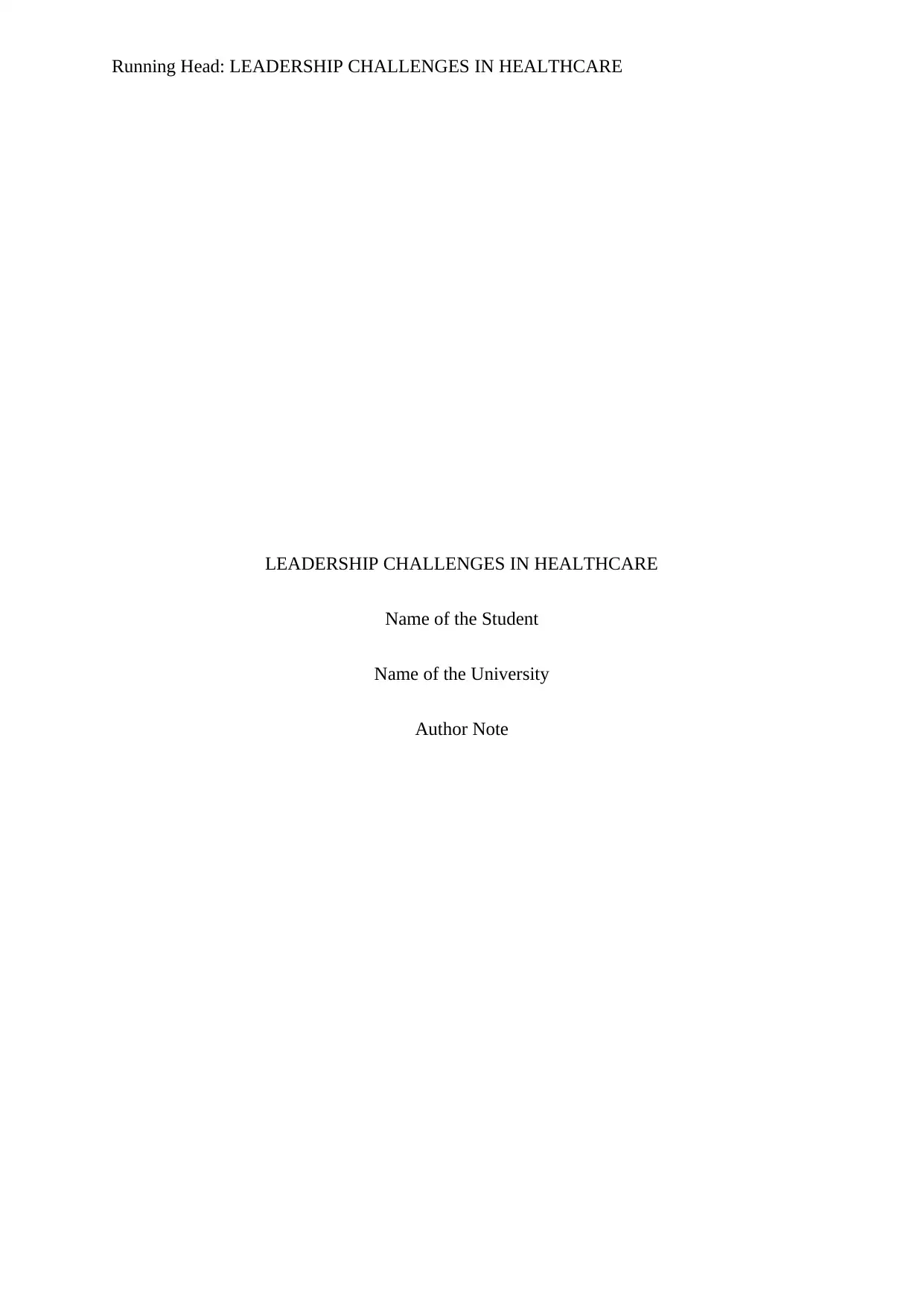
Running Head: LEADERSHIP CHALLENGES IN HEALTHCARE
LEADERSHIP CHALLENGES IN HEALTHCARE
Name of the Student
Name of the University
Author Note
LEADERSHIP CHALLENGES IN HEALTHCARE
Name of the Student
Name of the University
Author Note
Paraphrase This Document
Need a fresh take? Get an instant paraphrase of this document with our AI Paraphraser
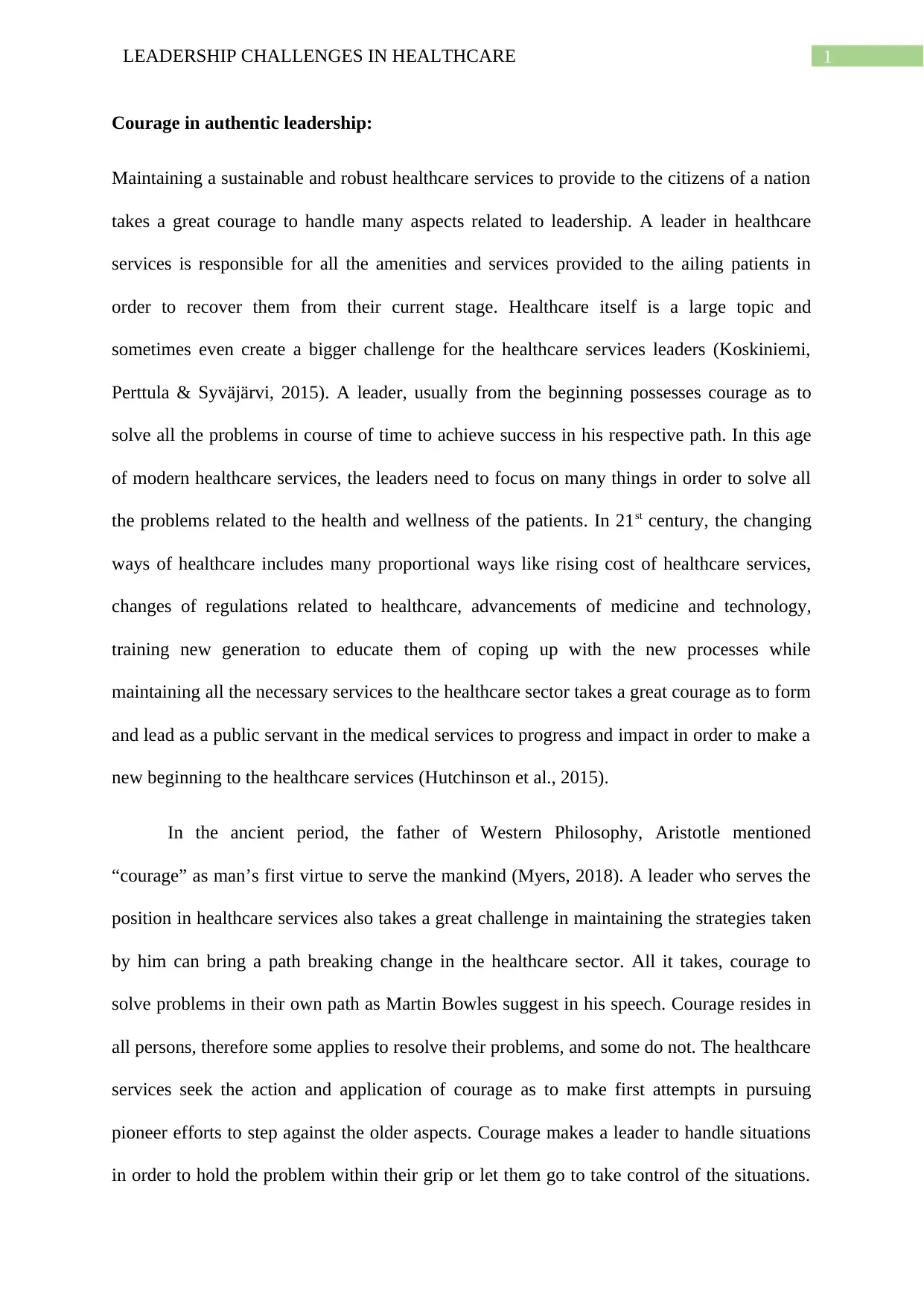
1LEADERSHIP CHALLENGES IN HEALTHCARE
Courage in authentic leadership:
Maintaining a sustainable and robust healthcare services to provide to the citizens of a nation
takes a great courage to handle many aspects related to leadership. A leader in healthcare
services is responsible for all the amenities and services provided to the ailing patients in
order to recover them from their current stage. Healthcare itself is a large topic and
sometimes even create a bigger challenge for the healthcare services leaders (Koskiniemi,
Perttula & Syväjärvi, 2015). A leader, usually from the beginning possesses courage as to
solve all the problems in course of time to achieve success in his respective path. In this age
of modern healthcare services, the leaders need to focus on many things in order to solve all
the problems related to the health and wellness of the patients. In 21st century, the changing
ways of healthcare includes many proportional ways like rising cost of healthcare services,
changes of regulations related to healthcare, advancements of medicine and technology,
training new generation to educate them of coping up with the new processes while
maintaining all the necessary services to the healthcare sector takes a great courage as to form
and lead as a public servant in the medical services to progress and impact in order to make a
new beginning to the healthcare services (Hutchinson et al., 2015).
In the ancient period, the father of Western Philosophy, Aristotle mentioned
“courage” as man’s first virtue to serve the mankind (Myers, 2018). A leader who serves the
position in healthcare services also takes a great challenge in maintaining the strategies taken
by him can bring a path breaking change in the healthcare sector. All it takes, courage to
solve problems in their own path as Martin Bowles suggest in his speech. Courage resides in
all persons, therefore some applies to resolve their problems, and some do not. The healthcare
services seek the action and application of courage as to make first attempts in pursuing
pioneer efforts to step against the older aspects. Courage makes a leader to handle situations
in order to hold the problem within their grip or let them go to take control of the situations.
Courage in authentic leadership:
Maintaining a sustainable and robust healthcare services to provide to the citizens of a nation
takes a great courage to handle many aspects related to leadership. A leader in healthcare
services is responsible for all the amenities and services provided to the ailing patients in
order to recover them from their current stage. Healthcare itself is a large topic and
sometimes even create a bigger challenge for the healthcare services leaders (Koskiniemi,
Perttula & Syväjärvi, 2015). A leader, usually from the beginning possesses courage as to
solve all the problems in course of time to achieve success in his respective path. In this age
of modern healthcare services, the leaders need to focus on many things in order to solve all
the problems related to the health and wellness of the patients. In 21st century, the changing
ways of healthcare includes many proportional ways like rising cost of healthcare services,
changes of regulations related to healthcare, advancements of medicine and technology,
training new generation to educate them of coping up with the new processes while
maintaining all the necessary services to the healthcare sector takes a great courage as to form
and lead as a public servant in the medical services to progress and impact in order to make a
new beginning to the healthcare services (Hutchinson et al., 2015).
In the ancient period, the father of Western Philosophy, Aristotle mentioned
“courage” as man’s first virtue to serve the mankind (Myers, 2018). A leader who serves the
position in healthcare services also takes a great challenge in maintaining the strategies taken
by him can bring a path breaking change in the healthcare sector. All it takes, courage to
solve problems in their own path as Martin Bowles suggest in his speech. Courage resides in
all persons, therefore some applies to resolve their problems, and some do not. The healthcare
services seek the action and application of courage as to make first attempts in pursuing
pioneer efforts to step against the older aspects. Courage makes a leader to handle situations
in order to hold the problem within their grip or let them go to take control of the situations.
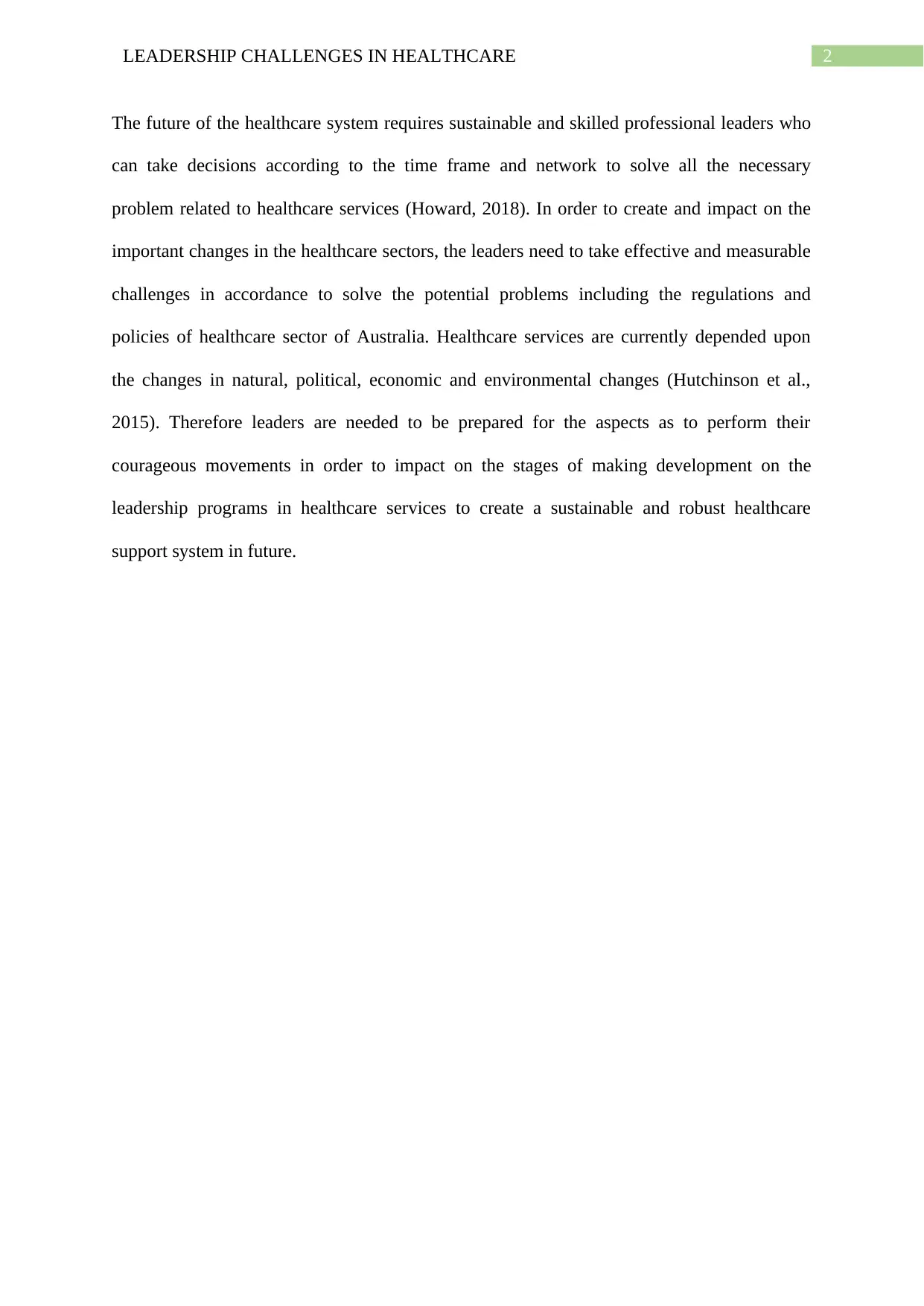
2LEADERSHIP CHALLENGES IN HEALTHCARE
The future of the healthcare system requires sustainable and skilled professional leaders who
can take decisions according to the time frame and network to solve all the necessary
problem related to healthcare services (Howard, 2018). In order to create and impact on the
important changes in the healthcare sectors, the leaders need to take effective and measurable
challenges in accordance to solve the potential problems including the regulations and
policies of healthcare sector of Australia. Healthcare services are currently depended upon
the changes in natural, political, economic and environmental changes (Hutchinson et al.,
2015). Therefore leaders are needed to be prepared for the aspects as to perform their
courageous movements in order to impact on the stages of making development on the
leadership programs in healthcare services to create a sustainable and robust healthcare
support system in future.
The future of the healthcare system requires sustainable and skilled professional leaders who
can take decisions according to the time frame and network to solve all the necessary
problem related to healthcare services (Howard, 2018). In order to create and impact on the
important changes in the healthcare sectors, the leaders need to take effective and measurable
challenges in accordance to solve the potential problems including the regulations and
policies of healthcare sector of Australia. Healthcare services are currently depended upon
the changes in natural, political, economic and environmental changes (Hutchinson et al.,
2015). Therefore leaders are needed to be prepared for the aspects as to perform their
courageous movements in order to impact on the stages of making development on the
leadership programs in healthcare services to create a sustainable and robust healthcare
support system in future.
⊘ This is a preview!⊘
Do you want full access?
Subscribe today to unlock all pages.

Trusted by 1+ million students worldwide
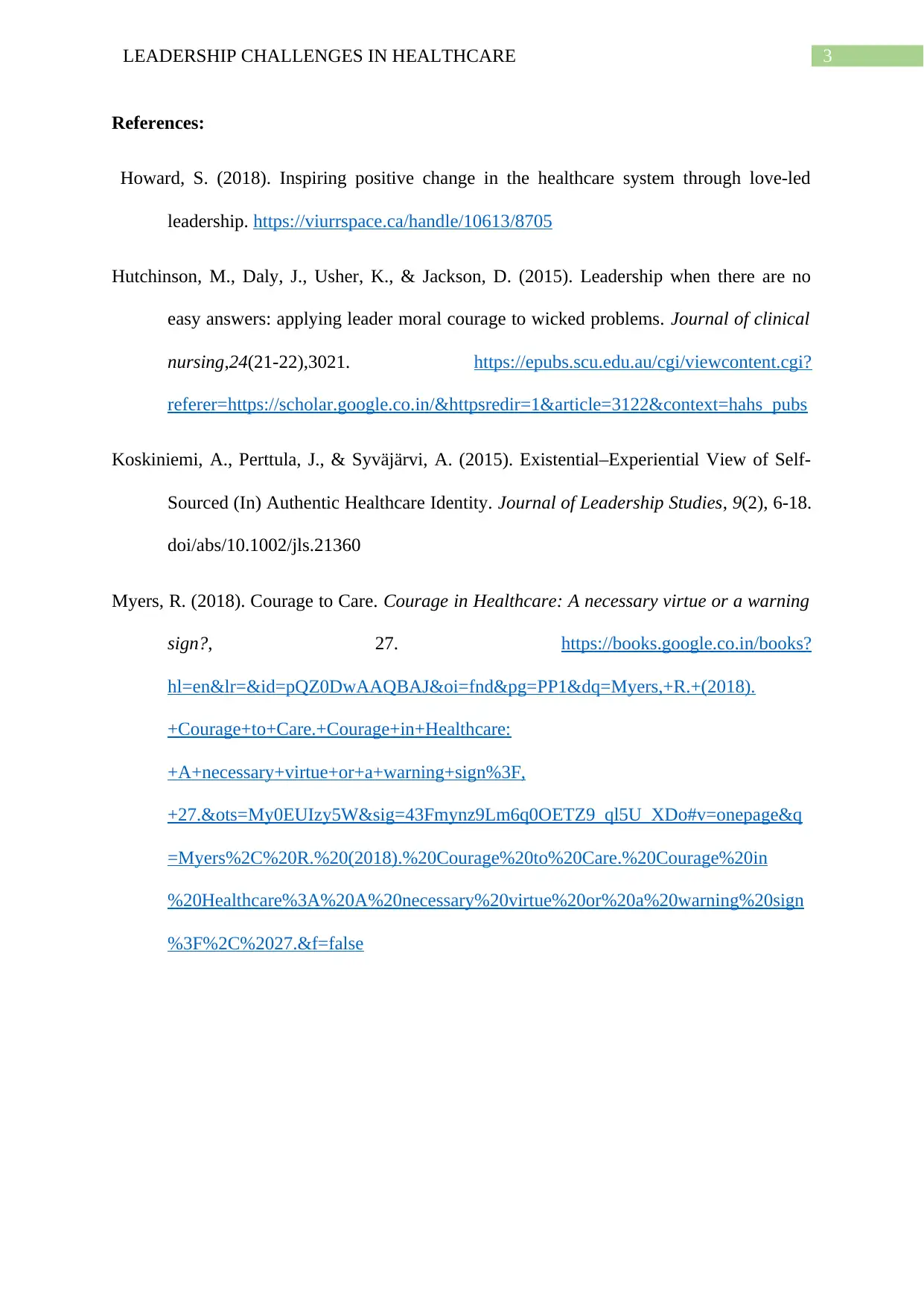
3LEADERSHIP CHALLENGES IN HEALTHCARE
References:
Howard, S. (2018). Inspiring positive change in the healthcare system through love-led
leadership. https://viurrspace.ca/handle/10613/8705
Hutchinson, M., Daly, J., Usher, K., & Jackson, D. (2015). Leadership when there are no
easy answers: applying leader moral courage to wicked problems. Journal of clinical
nursing,24(21-22),3021. https://epubs.scu.edu.au/cgi/viewcontent.cgi?
referer=https://scholar.google.co.in/&httpsredir=1&article=3122&context=hahs_pubs
Koskiniemi, A., Perttula, J., & Syväjärvi, A. (2015). Existential–Experiential View of Self‐
Sourced (In) Authentic Healthcare Identity. Journal of Leadership Studies, 9(2), 6-18.
doi/abs/10.1002/jls.21360
Myers, R. (2018). Courage to Care. Courage in Healthcare: A necessary virtue or a warning
sign?, 27. https://books.google.co.in/books?
hl=en&lr=&id=pQZ0DwAAQBAJ&oi=fnd&pg=PP1&dq=Myers,+R.+(2018).
+Courage+to+Care.+Courage+in+Healthcare:
+A+necessary+virtue+or+a+warning+sign%3F,
+27.&ots=My0EUIzy5W&sig=43Fmynz9Lm6q0OETZ9_ql5U_XDo#v=onepage&q
=Myers%2C%20R.%20(2018).%20Courage%20to%20Care.%20Courage%20in
%20Healthcare%3A%20A%20necessary%20virtue%20or%20a%20warning%20sign
%3F%2C%2027.&f=false
References:
Howard, S. (2018). Inspiring positive change in the healthcare system through love-led
leadership. https://viurrspace.ca/handle/10613/8705
Hutchinson, M., Daly, J., Usher, K., & Jackson, D. (2015). Leadership when there are no
easy answers: applying leader moral courage to wicked problems. Journal of clinical
nursing,24(21-22),3021. https://epubs.scu.edu.au/cgi/viewcontent.cgi?
referer=https://scholar.google.co.in/&httpsredir=1&article=3122&context=hahs_pubs
Koskiniemi, A., Perttula, J., & Syväjärvi, A. (2015). Existential–Experiential View of Self‐
Sourced (In) Authentic Healthcare Identity. Journal of Leadership Studies, 9(2), 6-18.
doi/abs/10.1002/jls.21360
Myers, R. (2018). Courage to Care. Courage in Healthcare: A necessary virtue or a warning
sign?, 27. https://books.google.co.in/books?
hl=en&lr=&id=pQZ0DwAAQBAJ&oi=fnd&pg=PP1&dq=Myers,+R.+(2018).
+Courage+to+Care.+Courage+in+Healthcare:
+A+necessary+virtue+or+a+warning+sign%3F,
+27.&ots=My0EUIzy5W&sig=43Fmynz9Lm6q0OETZ9_ql5U_XDo#v=onepage&q
=Myers%2C%20R.%20(2018).%20Courage%20to%20Care.%20Courage%20in
%20Healthcare%3A%20A%20necessary%20virtue%20or%20a%20warning%20sign
%3F%2C%2027.&f=false
Paraphrase This Document
Need a fresh take? Get an instant paraphrase of this document with our AI Paraphraser
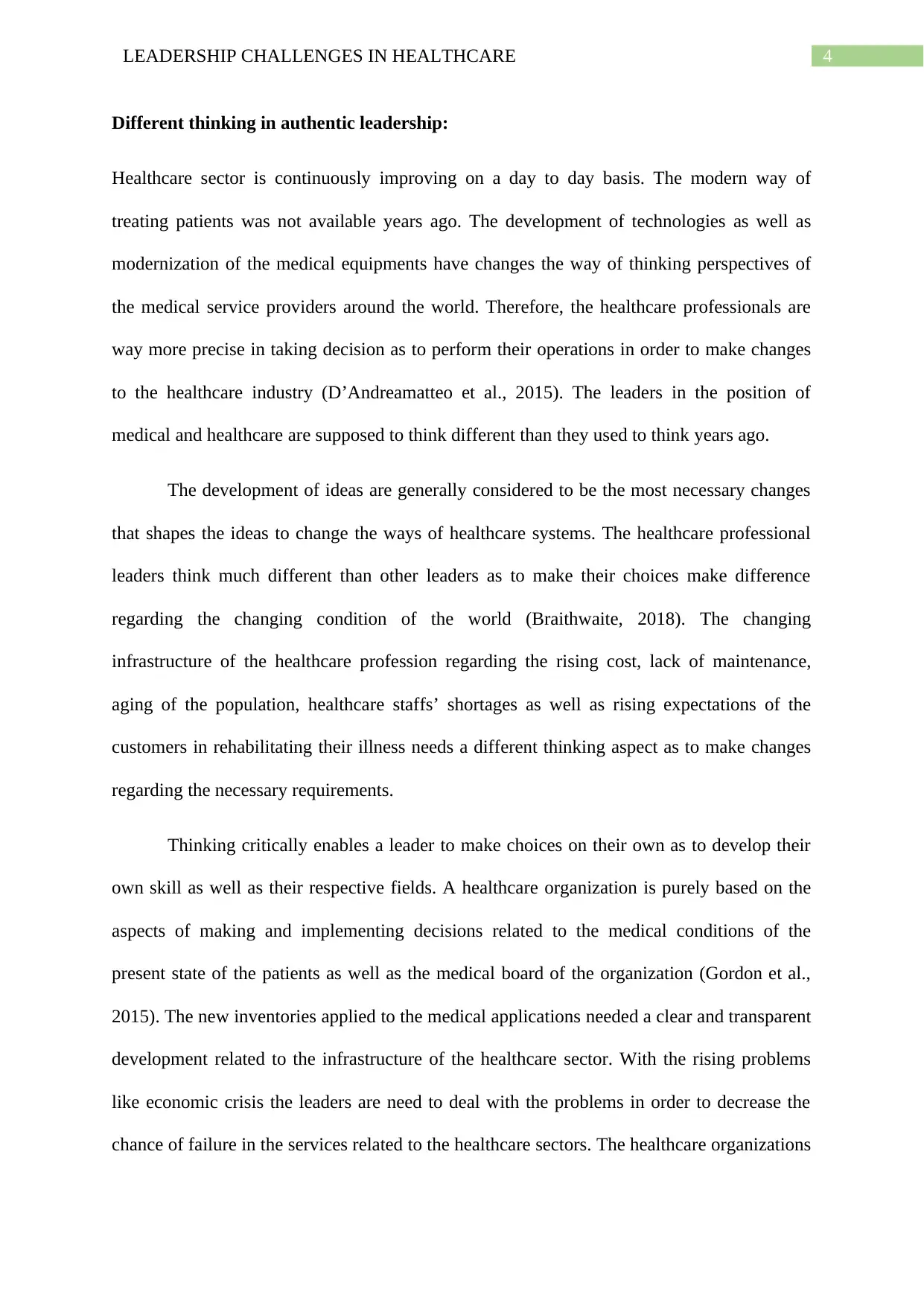
4LEADERSHIP CHALLENGES IN HEALTHCARE
Different thinking in authentic leadership:
Healthcare sector is continuously improving on a day to day basis. The modern way of
treating patients was not available years ago. The development of technologies as well as
modernization of the medical equipments have changes the way of thinking perspectives of
the medical service providers around the world. Therefore, the healthcare professionals are
way more precise in taking decision as to perform their operations in order to make changes
to the healthcare industry (D’Andreamatteo et al., 2015). The leaders in the position of
medical and healthcare are supposed to think different than they used to think years ago.
The development of ideas are generally considered to be the most necessary changes
that shapes the ideas to change the ways of healthcare systems. The healthcare professional
leaders think much different than other leaders as to make their choices make difference
regarding the changing condition of the world (Braithwaite, 2018). The changing
infrastructure of the healthcare profession regarding the rising cost, lack of maintenance,
aging of the population, healthcare staffs’ shortages as well as rising expectations of the
customers in rehabilitating their illness needs a different thinking aspect as to make changes
regarding the necessary requirements.
Thinking critically enables a leader to make choices on their own as to develop their
own skill as well as their respective fields. A healthcare organization is purely based on the
aspects of making and implementing decisions related to the medical conditions of the
present state of the patients as well as the medical board of the organization (Gordon et al.,
2015). The new inventories applied to the medical applications needed a clear and transparent
development related to the infrastructure of the healthcare sector. With the rising problems
like economic crisis the leaders are need to deal with the problems in order to decrease the
chance of failure in the services related to the healthcare sectors. The healthcare organizations
Different thinking in authentic leadership:
Healthcare sector is continuously improving on a day to day basis. The modern way of
treating patients was not available years ago. The development of technologies as well as
modernization of the medical equipments have changes the way of thinking perspectives of
the medical service providers around the world. Therefore, the healthcare professionals are
way more precise in taking decision as to perform their operations in order to make changes
to the healthcare industry (D’Andreamatteo et al., 2015). The leaders in the position of
medical and healthcare are supposed to think different than they used to think years ago.
The development of ideas are generally considered to be the most necessary changes
that shapes the ideas to change the ways of healthcare systems. The healthcare professional
leaders think much different than other leaders as to make their choices make difference
regarding the changing condition of the world (Braithwaite, 2018). The changing
infrastructure of the healthcare profession regarding the rising cost, lack of maintenance,
aging of the population, healthcare staffs’ shortages as well as rising expectations of the
customers in rehabilitating their illness needs a different thinking aspect as to make changes
regarding the necessary requirements.
Thinking critically enables a leader to make choices on their own as to develop their
own skill as well as their respective fields. A healthcare organization is purely based on the
aspects of making and implementing decisions related to the medical conditions of the
present state of the patients as well as the medical board of the organization (Gordon et al.,
2015). The new inventories applied to the medical applications needed a clear and transparent
development related to the infrastructure of the healthcare sector. With the rising problems
like economic crisis the leaders are need to deal with the problems in order to decrease the
chance of failure in the services related to the healthcare sectors. The healthcare organizations
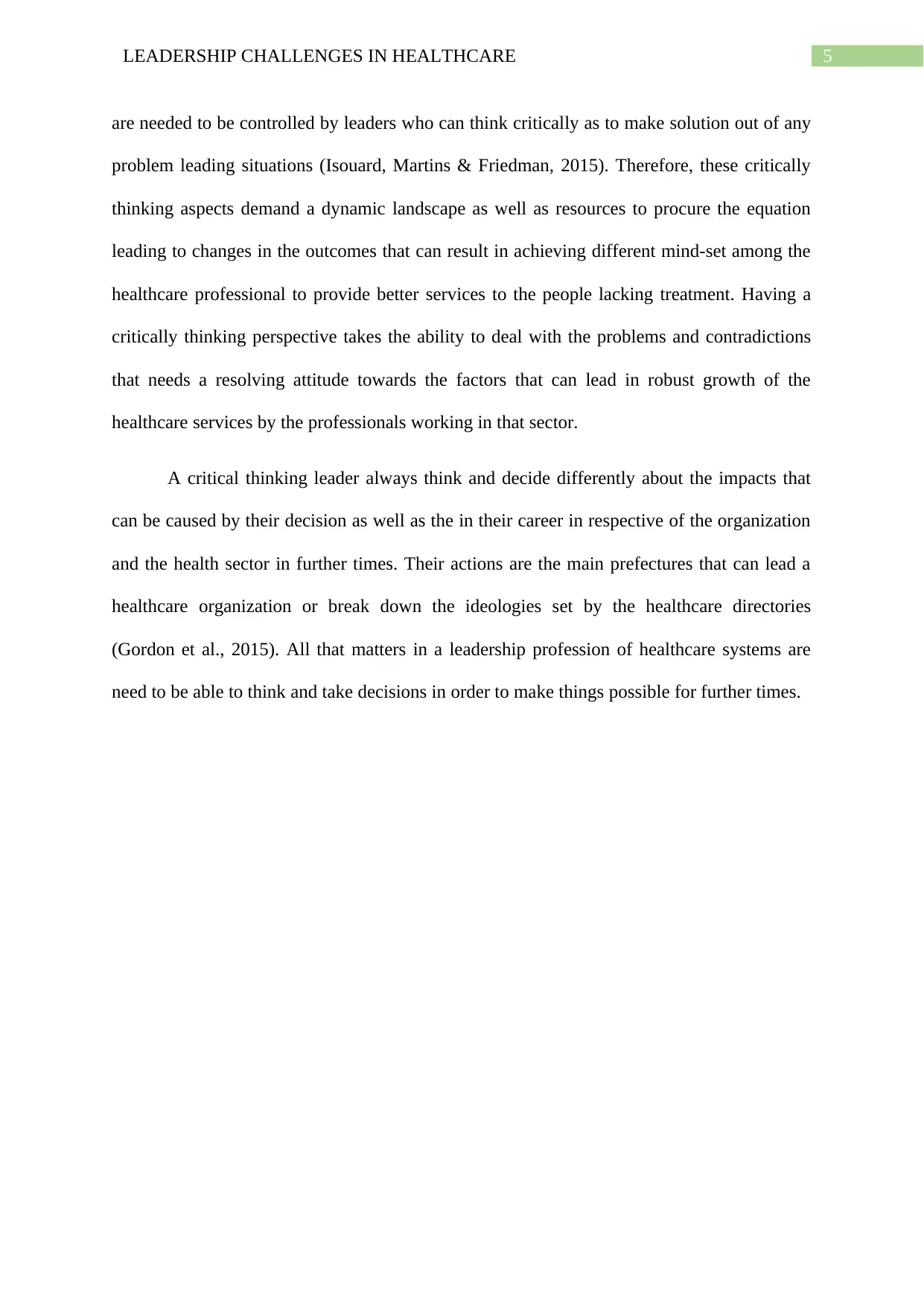
5LEADERSHIP CHALLENGES IN HEALTHCARE
are needed to be controlled by leaders who can think critically as to make solution out of any
problem leading situations (Isouard, Martins & Friedman, 2015). Therefore, these critically
thinking aspects demand a dynamic landscape as well as resources to procure the equation
leading to changes in the outcomes that can result in achieving different mind-set among the
healthcare professional to provide better services to the people lacking treatment. Having a
critically thinking perspective takes the ability to deal with the problems and contradictions
that needs a resolving attitude towards the factors that can lead in robust growth of the
healthcare services by the professionals working in that sector.
A critical thinking leader always think and decide differently about the impacts that
can be caused by their decision as well as the in their career in respective of the organization
and the health sector in further times. Their actions are the main prefectures that can lead a
healthcare organization or break down the ideologies set by the healthcare directories
(Gordon et al., 2015). All that matters in a leadership profession of healthcare systems are
need to be able to think and take decisions in order to make things possible for further times.
are needed to be controlled by leaders who can think critically as to make solution out of any
problem leading situations (Isouard, Martins & Friedman, 2015). Therefore, these critically
thinking aspects demand a dynamic landscape as well as resources to procure the equation
leading to changes in the outcomes that can result in achieving different mind-set among the
healthcare professional to provide better services to the people lacking treatment. Having a
critically thinking perspective takes the ability to deal with the problems and contradictions
that needs a resolving attitude towards the factors that can lead in robust growth of the
healthcare services by the professionals working in that sector.
A critical thinking leader always think and decide differently about the impacts that
can be caused by their decision as well as the in their career in respective of the organization
and the health sector in further times. Their actions are the main prefectures that can lead a
healthcare organization or break down the ideologies set by the healthcare directories
(Gordon et al., 2015). All that matters in a leadership profession of healthcare systems are
need to be able to think and take decisions in order to make things possible for further times.
⊘ This is a preview!⊘
Do you want full access?
Subscribe today to unlock all pages.

Trusted by 1+ million students worldwide
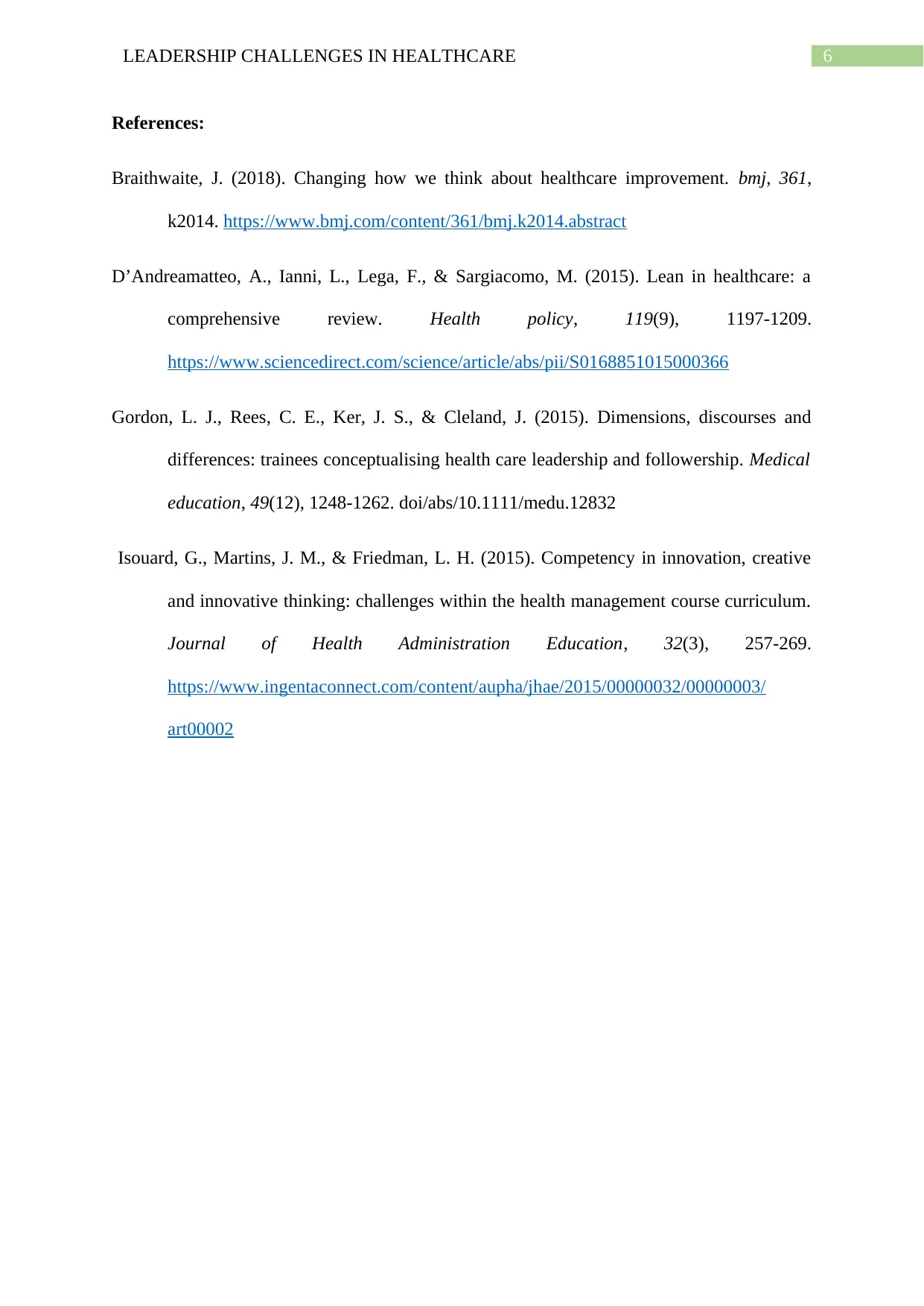
6LEADERSHIP CHALLENGES IN HEALTHCARE
References:
Braithwaite, J. (2018). Changing how we think about healthcare improvement. bmj, 361,
k2014. https://www.bmj.com/content/361/bmj.k2014.abstract
D’Andreamatteo, A., Ianni, L., Lega, F., & Sargiacomo, M. (2015). Lean in healthcare: a
comprehensive review. Health policy, 119(9), 1197-1209.
https://www.sciencedirect.com/science/article/abs/pii/S0168851015000366
Gordon, L. J., Rees, C. E., Ker, J. S., & Cleland, J. (2015). Dimensions, discourses and
differences: trainees conceptualising health care leadership and followership. Medical
education, 49(12), 1248-1262. doi/abs/10.1111/medu.12832
Isouard, G., Martins, J. M., & Friedman, L. H. (2015). Competency in innovation, creative
and innovative thinking: challenges within the health management course curriculum.
Journal of Health Administration Education, 32(3), 257-269.
https://www.ingentaconnect.com/content/aupha/jhae/2015/00000032/00000003/
art00002
References:
Braithwaite, J. (2018). Changing how we think about healthcare improvement. bmj, 361,
k2014. https://www.bmj.com/content/361/bmj.k2014.abstract
D’Andreamatteo, A., Ianni, L., Lega, F., & Sargiacomo, M. (2015). Lean in healthcare: a
comprehensive review. Health policy, 119(9), 1197-1209.
https://www.sciencedirect.com/science/article/abs/pii/S0168851015000366
Gordon, L. J., Rees, C. E., Ker, J. S., & Cleland, J. (2015). Dimensions, discourses and
differences: trainees conceptualising health care leadership and followership. Medical
education, 49(12), 1248-1262. doi/abs/10.1111/medu.12832
Isouard, G., Martins, J. M., & Friedman, L. H. (2015). Competency in innovation, creative
and innovative thinking: challenges within the health management course curriculum.
Journal of Health Administration Education, 32(3), 257-269.
https://www.ingentaconnect.com/content/aupha/jhae/2015/00000032/00000003/
art00002
Paraphrase This Document
Need a fresh take? Get an instant paraphrase of this document with our AI Paraphraser
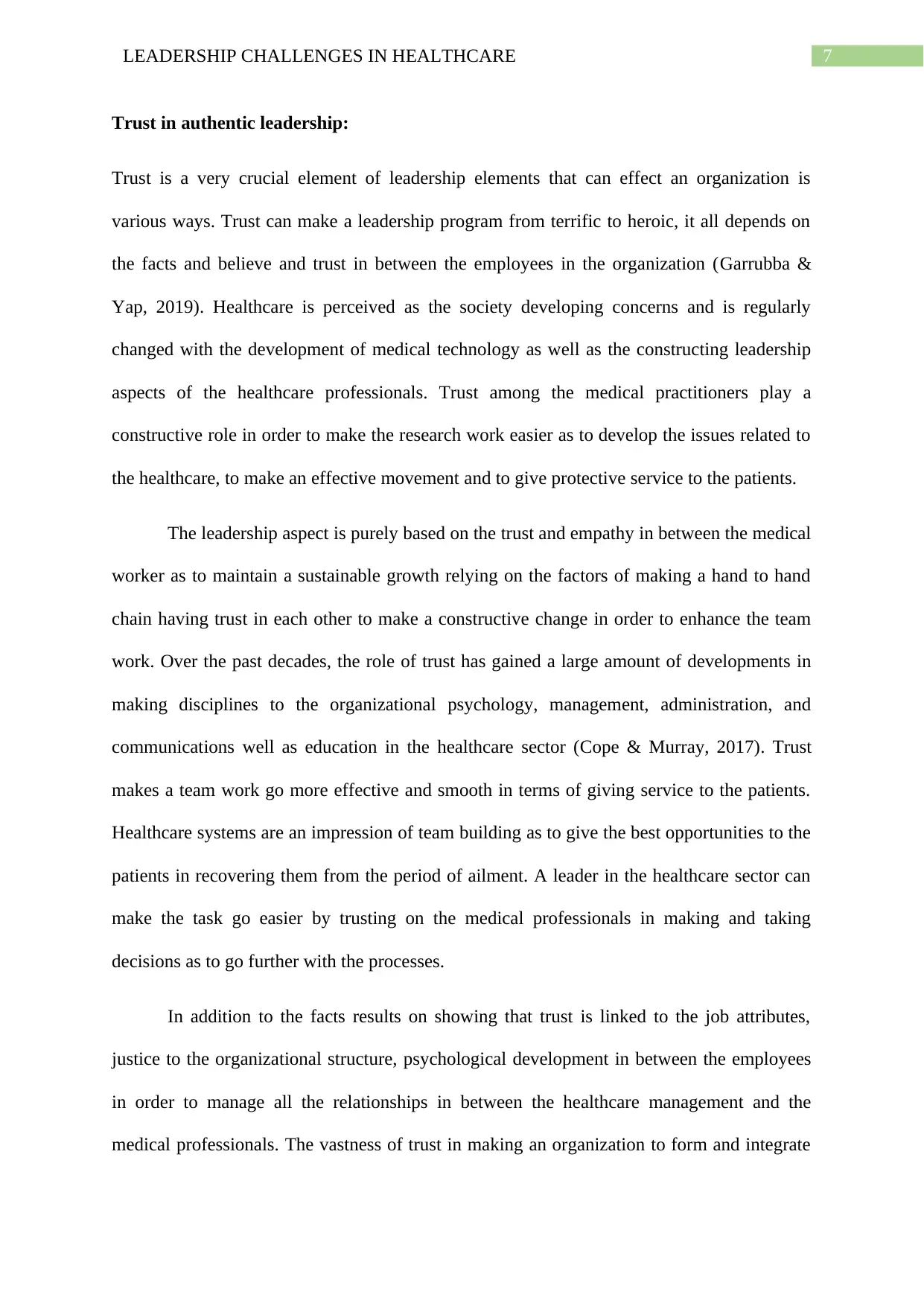
7LEADERSHIP CHALLENGES IN HEALTHCARE
Trust in authentic leadership:
Trust is a very crucial element of leadership elements that can effect an organization is
various ways. Trust can make a leadership program from terrific to heroic, it all depends on
the facts and believe and trust in between the employees in the organization (Garrubba &
Yap, 2019). Healthcare is perceived as the society developing concerns and is regularly
changed with the development of medical technology as well as the constructing leadership
aspects of the healthcare professionals. Trust among the medical practitioners play a
constructive role in order to make the research work easier as to develop the issues related to
the healthcare, to make an effective movement and to give protective service to the patients.
The leadership aspect is purely based on the trust and empathy in between the medical
worker as to maintain a sustainable growth relying on the factors of making a hand to hand
chain having trust in each other to make a constructive change in order to enhance the team
work. Over the past decades, the role of trust has gained a large amount of developments in
making disciplines to the organizational psychology, management, administration, and
communications well as education in the healthcare sector (Cope & Murray, 2017). Trust
makes a team work go more effective and smooth in terms of giving service to the patients.
Healthcare systems are an impression of team building as to give the best opportunities to the
patients in recovering them from the period of ailment. A leader in the healthcare sector can
make the task go easier by trusting on the medical professionals in making and taking
decisions as to go further with the processes.
In addition to the facts results on showing that trust is linked to the job attributes,
justice to the organizational structure, psychological development in between the employees
in order to manage all the relationships in between the healthcare management and the
medical professionals. The vastness of trust in making an organization to form and integrate
Trust in authentic leadership:
Trust is a very crucial element of leadership elements that can effect an organization is
various ways. Trust can make a leadership program from terrific to heroic, it all depends on
the facts and believe and trust in between the employees in the organization (Garrubba &
Yap, 2019). Healthcare is perceived as the society developing concerns and is regularly
changed with the development of medical technology as well as the constructing leadership
aspects of the healthcare professionals. Trust among the medical practitioners play a
constructive role in order to make the research work easier as to develop the issues related to
the healthcare, to make an effective movement and to give protective service to the patients.
The leadership aspect is purely based on the trust and empathy in between the medical
worker as to maintain a sustainable growth relying on the factors of making a hand to hand
chain having trust in each other to make a constructive change in order to enhance the team
work. Over the past decades, the role of trust has gained a large amount of developments in
making disciplines to the organizational psychology, management, administration, and
communications well as education in the healthcare sector (Cope & Murray, 2017). Trust
makes a team work go more effective and smooth in terms of giving service to the patients.
Healthcare systems are an impression of team building as to give the best opportunities to the
patients in recovering them from the period of ailment. A leader in the healthcare sector can
make the task go easier by trusting on the medical professionals in making and taking
decisions as to go further with the processes.
In addition to the facts results on showing that trust is linked to the job attributes,
justice to the organizational structure, psychological development in between the employees
in order to manage all the relationships in between the healthcare management and the
medical professionals. The vastness of trust in making an organization to form and integrate
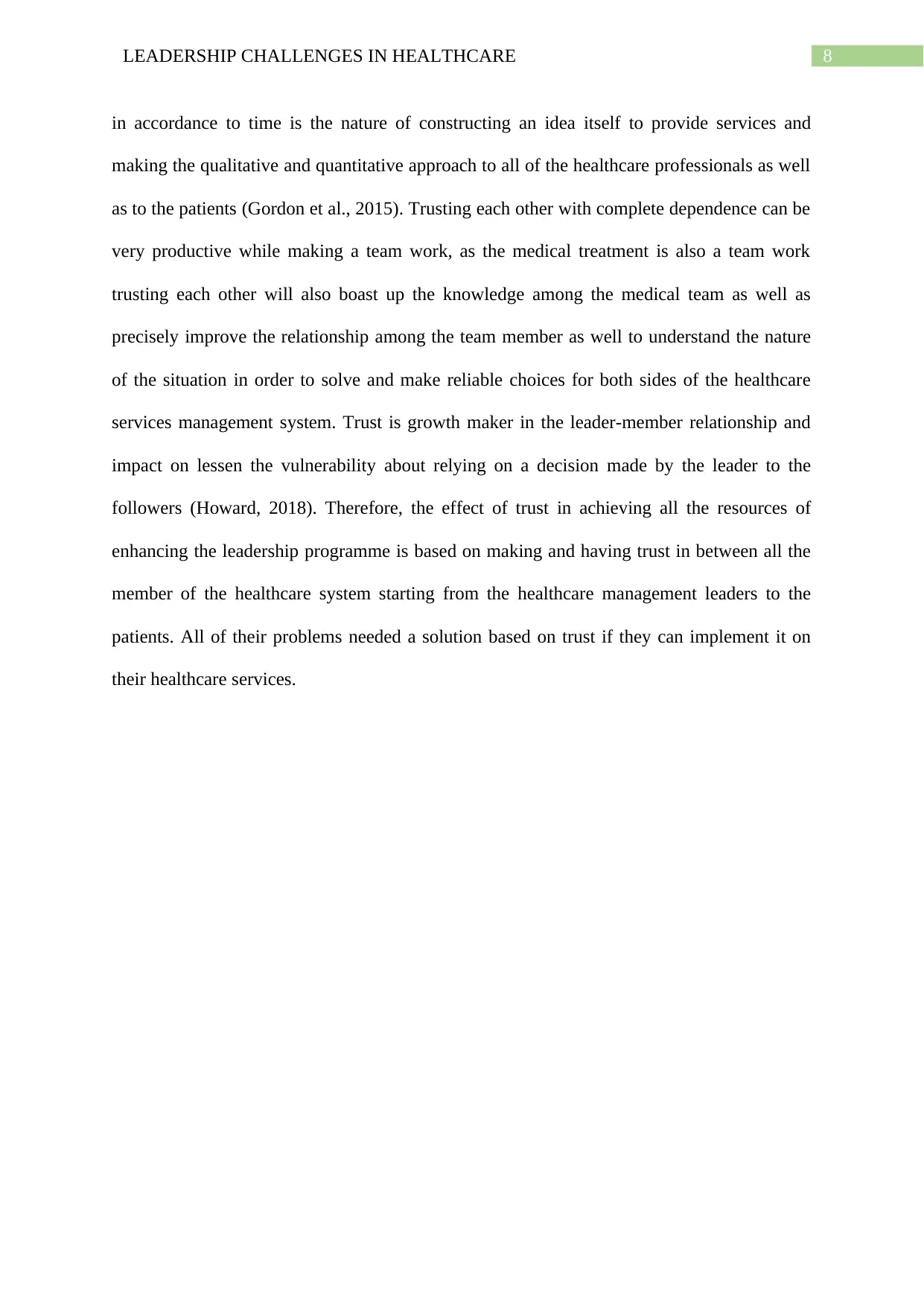
8LEADERSHIP CHALLENGES IN HEALTHCARE
in accordance to time is the nature of constructing an idea itself to provide services and
making the qualitative and quantitative approach to all of the healthcare professionals as well
as to the patients (Gordon et al., 2015). Trusting each other with complete dependence can be
very productive while making a team work, as the medical treatment is also a team work
trusting each other will also boast up the knowledge among the medical team as well as
precisely improve the relationship among the team member as well to understand the nature
of the situation in order to solve and make reliable choices for both sides of the healthcare
services management system. Trust is growth maker in the leader-member relationship and
impact on lessen the vulnerability about relying on a decision made by the leader to the
followers (Howard, 2018). Therefore, the effect of trust in achieving all the resources of
enhancing the leadership programme is based on making and having trust in between all the
member of the healthcare system starting from the healthcare management leaders to the
patients. All of their problems needed a solution based on trust if they can implement it on
their healthcare services.
in accordance to time is the nature of constructing an idea itself to provide services and
making the qualitative and quantitative approach to all of the healthcare professionals as well
as to the patients (Gordon et al., 2015). Trusting each other with complete dependence can be
very productive while making a team work, as the medical treatment is also a team work
trusting each other will also boast up the knowledge among the medical team as well as
precisely improve the relationship among the team member as well to understand the nature
of the situation in order to solve and make reliable choices for both sides of the healthcare
services management system. Trust is growth maker in the leader-member relationship and
impact on lessen the vulnerability about relying on a decision made by the leader to the
followers (Howard, 2018). Therefore, the effect of trust in achieving all the resources of
enhancing the leadership programme is based on making and having trust in between all the
member of the healthcare system starting from the healthcare management leaders to the
patients. All of their problems needed a solution based on trust if they can implement it on
their healthcare services.
⊘ This is a preview!⊘
Do you want full access?
Subscribe today to unlock all pages.

Trusted by 1+ million students worldwide
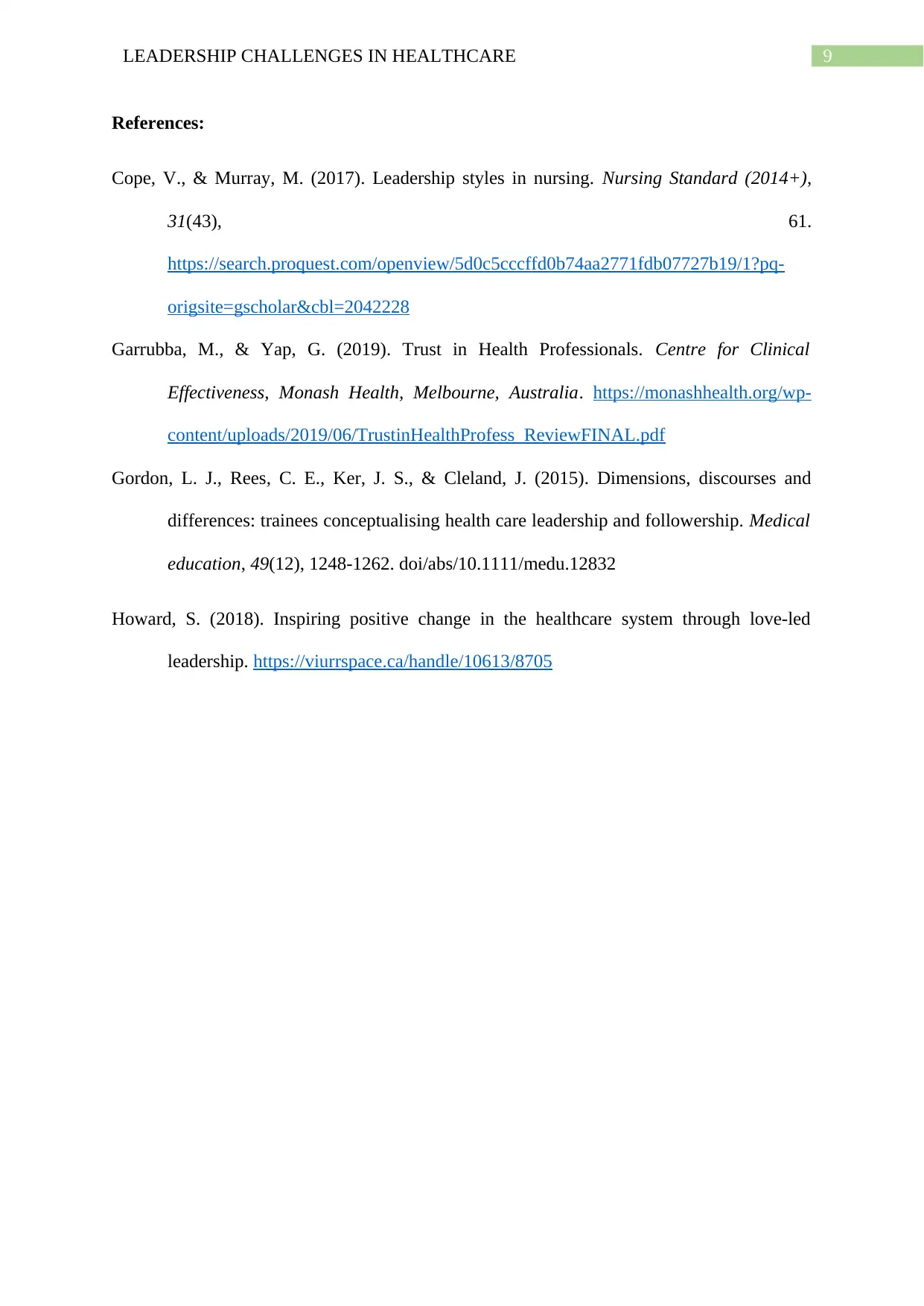
9LEADERSHIP CHALLENGES IN HEALTHCARE
References:
Cope, V., & Murray, M. (2017). Leadership styles in nursing. Nursing Standard (2014+),
31(43), 61.
https://search.proquest.com/openview/5d0c5cccffd0b74aa2771fdb07727b19/1?pq-
origsite=gscholar&cbl=2042228
Garrubba, M., & Yap, G. (2019). Trust in Health Professionals. Centre for Clinical
Effectiveness, Monash Health, Melbourne, Australia. https://monashhealth.org/wp-
content/uploads/2019/06/TrustinHealthProfess_ReviewFINAL.pdf
Gordon, L. J., Rees, C. E., Ker, J. S., & Cleland, J. (2015). Dimensions, discourses and
differences: trainees conceptualising health care leadership and followership. Medical
education, 49(12), 1248-1262. doi/abs/10.1111/medu.12832
Howard, S. (2018). Inspiring positive change in the healthcare system through love-led
leadership. https://viurrspace.ca/handle/10613/8705
References:
Cope, V., & Murray, M. (2017). Leadership styles in nursing. Nursing Standard (2014+),
31(43), 61.
https://search.proquest.com/openview/5d0c5cccffd0b74aa2771fdb07727b19/1?pq-
origsite=gscholar&cbl=2042228
Garrubba, M., & Yap, G. (2019). Trust in Health Professionals. Centre for Clinical
Effectiveness, Monash Health, Melbourne, Australia. https://monashhealth.org/wp-
content/uploads/2019/06/TrustinHealthProfess_ReviewFINAL.pdf
Gordon, L. J., Rees, C. E., Ker, J. S., & Cleland, J. (2015). Dimensions, discourses and
differences: trainees conceptualising health care leadership and followership. Medical
education, 49(12), 1248-1262. doi/abs/10.1111/medu.12832
Howard, S. (2018). Inspiring positive change in the healthcare system through love-led
leadership. https://viurrspace.ca/handle/10613/8705
1 out of 10
Related Documents
Your All-in-One AI-Powered Toolkit for Academic Success.
+13062052269
info@desklib.com
Available 24*7 on WhatsApp / Email
![[object Object]](/_next/static/media/star-bottom.7253800d.svg)
Unlock your academic potential
Copyright © 2020–2025 A2Z Services. All Rights Reserved. Developed and managed by ZUCOL.





